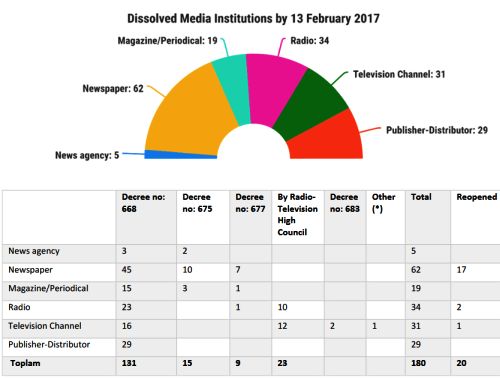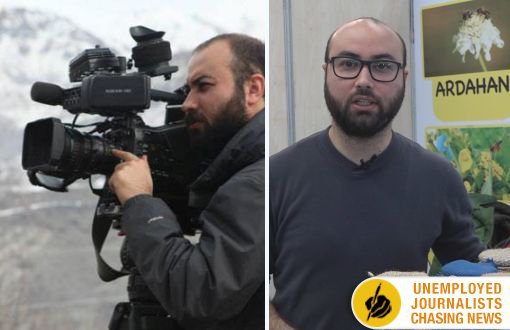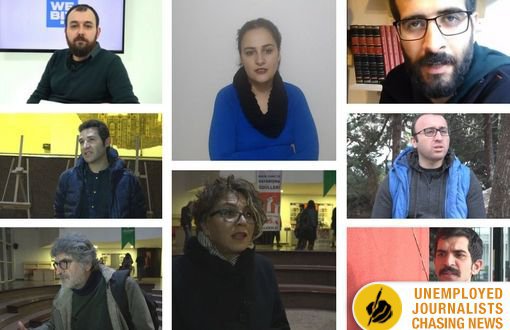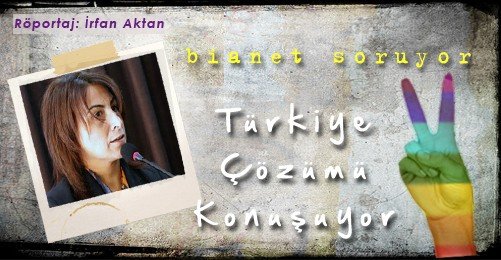Click to read the article in Turkish / Kurdish
The Justice and Development Party (AKP) government's intensive crackdowns and operations started right after the Gezi Park protests, which started in İstanbul's Taksim district on May 31, 2013 and spread across Turkey.
12 people lost their lives during and after the protests, and 7,959 people were injured, 59 of them heavily.
Journalists faced many attacks from June 2013, when the Gezi protests started, to September 2013. At least 153 journalists, including 10 foreign journalists, were battered and wounded with pepper gas and plastic bullets.
Journalists’ efforts to cover events were prevented. The photos and video recordings of a large number of journalists were deleted by force. 39 journalists were detained; three others were arrested and charged with a crimes during this period.
Many journalists who took a critical stand or refused to make news in line with the government’s agenda were sacked from their jobs through direct or indirect reasons. There are no net figures from public institutions like the state channel TRT nor the mainstream media as to the number of sacked journalists. However, Gezi is considered a milestone for the mass discharge of journalists.
The collective discharge of the journalists.
Evaluation by the TGS chair
Confederation of Progressive Trade Unions of Turkey (DİSK) Press Labor Chair Faruk Eren, in his evaluation, said, “Though we don’t know how many journalists became unemployed after the Gezi resistance, a huge injustice has started since that date”.
“For instance, a lot of journalists were sacked from TRT just because of their tweets. A similar injustice occurred in pro-government media outlets.
“Nevertheless, the greatest injustice took place in the pro-Gülen media following the AKP-Gülen conflict. With trustee appointment to the Gülen community’s media, we estimate as many as 2,500 journalists were left unemployed.
“Nevertheless, the number of those who found work at different jobs or who could find the chance to practice their profession is unknown. Since most of the journalists are not organized, their employment status or whether they have started a new job cannot be known.
“But we know that the journalists who became unemployed through the statutory decrees are not employed in the mainstream media. As Serpil Sayumlu said, ‘Let’s say you are a tailor for 20 years, and one day they prohibit you from using needle, thread, and fabric. Our situation is exactly like this.’”
Balance sheet of the AKP-Gülen conflict

Source: 21Statutory Decrees Under State of Emergency - F. Salman/A. Ergün- bianet
Of the big purges in the media mark the aftermath of the AKP-Gülen community, which were almost partners in governing since 2003.
The most concrete example of the government-community conflict that started with Gülen community demanding more from the government surfaced with the fraud operation on December 17-25, 2013. The most concrete example of this conflict between the government and the Gülen community, which started with the community demanding more from the government, was revealed through the fraud operation that took place between December 17-23, 2013.
Trustees were appointed to the newspapers Millet and Bugün in İpek Koza Holding on October 2015, to Zaman, Today’s Zaman, and Meydan newspapers, Cihan News Agency and Aksiyon Magazine. The trustees closed down the newspapers.
Trustees were appointed in October 2015 to the newspapers Millet and Bugun, which were owned by Ipek Koza Holding. In March 2016, Cihan New Agency’s Zaman, Today’s Zaman and Meydan newspapers as well as Aksiyon Magazine were appointed trustees. The trustees closed down the newspapers.
178 media outlets were closed through the statutory decrees No. 668 (July 27, 2016), No. 675 (October 29, 2016), and 677 (November 22, 2016) issued as part of the State of Emergency declared on July 20, 2016, following the July 15 coup attempt.
According to the study by DİSK (Confederation of Progressive Trade Unions of Turkey) Basın İŞ (Press Labor): 2,308 insured workers were left unemployed in the press, publishing and journalism sectors. It is not only that these people cannot receive their unemployment pay, but also they won’t be able to collect their debts owed even if they open a lawsuit.
Both resolution process and Kurdish media were closed
The government’s comprehensive operations against the Kurdish media started on July 24, 2015. Two days after an ISIS attack launched in Suruç on July 20, 2015, two police officers were killed in their homes on July 22 in Ceylanpınar district of Şanlıurfa province. A day later, it was decided in the security meeting held under the presidency of then-Prime Minister Ahmet Davutoğlu that an operation would be carried out against the PKK (Kurdistan Workers’ Party).
On July 24, when a military campaign was launched in Qandil, over 90 news websites that report on developments concerning the Kurdish issue,including Özgür Gündem, Azadiya Welat, and Özgür Politika, were blocked. The crackdowns against the Kurdish media intensified in this period of clashes. 23 TV and radio channels were closed on the grounds of “supporting destructor?destructive? and separatist activities” through the second statutory decree.
According to BİA’s Media Monitoring Report 2016, 778 press cards were cancelled; the property of 54 journalists was confiscated; the passports of 46 journalists were cancelled, and 3 people were discriminated against in terms of receiving accreditation.
The same report noted that 348 media workers, writers and journalists were fired in 2015, 339 in 2014, and 143 in 2013. This figure jumped to 2,708 in 2016.
According to information that the TGS Secretary of General Organization Mustafa Kuleli shared based on the data of Turkish Statistical Institute (TÜİK) and the Ministry of Labor and Social Security, there are 95,000 workers in the Press-Publication-Journalism sector. Of the se workers, 24,000 are journalists and 9,000 are unemployed. Among 15,000 active journalists, 3,000 are union members. The number of media workers who made use of collective labor agreement is around 2,000.
According to the Progressive Journalists Association, three media workers were killed; 80 others were arrested; 299 were detained, and 32 were battered, subjected to violence or threatened in 2016. Within the same year, seven journalists were deported; 2,622 media workers were left unemployed; five broadcasting organizations were attacked; 157 media outlets, 9 publishing houses and companies were closed; 3 press centers were raided by police; gag orders were issued for 24 incidents; 20 websites were blocked, and 624 press cards and 32 parliamentary cards were revoked. According to TGS’ data, 142 journalists are behind bars as of January 19, 2017.
Even though different institutions share different figures as to the number of journalists left unemployed, there is a consensus that the number in the for the country overall is around 9,000-10,000.
According to TÜİK’s data in 2015, journalists have the highest rate of being unemployed among university graduates. As the unemployment rate was 9.9% in 2014, the figure was 29.1% in the field of journalism.
Despite having 24,000 people in the labor force by the end of 2014, 7,000 journalists were left unemployed in the sector, with 17,000 journalists employed. The unemployment rate of people who graduated from the fields of journalism and information almost tripled the average unemployment rate of those who graduated from a university or faculty.
There are only six media outlets who work with a collective labor agreement in Turkey. Five of them (Cumhuriyet, Evrensel, BirGün, bianet and Yurt ) are organized through TGS, and the other (Anadolu Agency) is organized in the Media-Labor union. (İA-EG/NU/HK)
***
UNEMPLOYED JOURNALİSTS CHASİNG NEWS
1- Even Though They Speak Through Their New “Occupations,” They Are Journalists
2- Journalism is Banned under theState of Emergency
3- Germany: New Generation Diaspora/Kopuntu
4- Germany: Immigration of the Suffocated
5- The Organization that Made "The Arab Girl Looks from the Window"
6- How They Work/Cannot Work, Breaking Down the Stereotypes
7- They Marry White People to Avoid Discrimination
8- Private Rehabilitation Centers and Problems: The Example of Bingöl
9- Two Directors Discuss the “Educational Support for People with Disabilities” Practices
10- 'Solution is Inclusion System in Education for People with Disabilities'
11- Students and Parents from Bingöl Tell of Their Experiences
* The "Unemployed Journalists Chasing News" project is being realized with the financial support of Matra-Human Rights Program of Consulate General of the Kingdom of the Netherlands.











